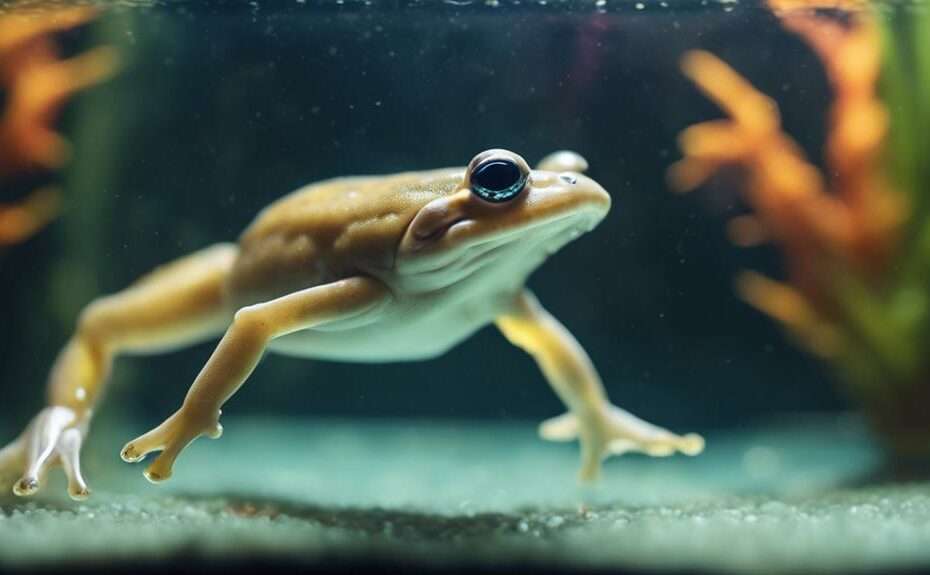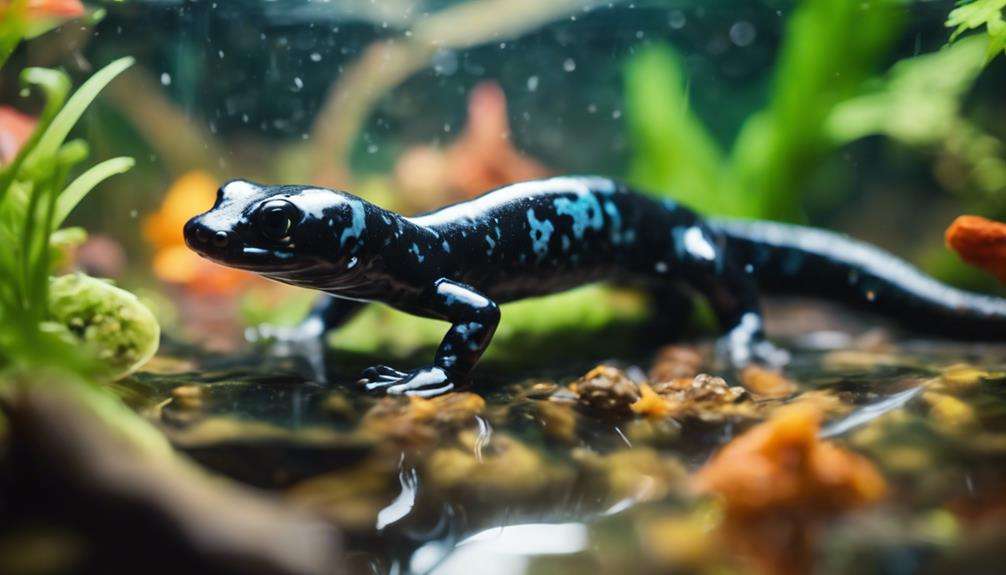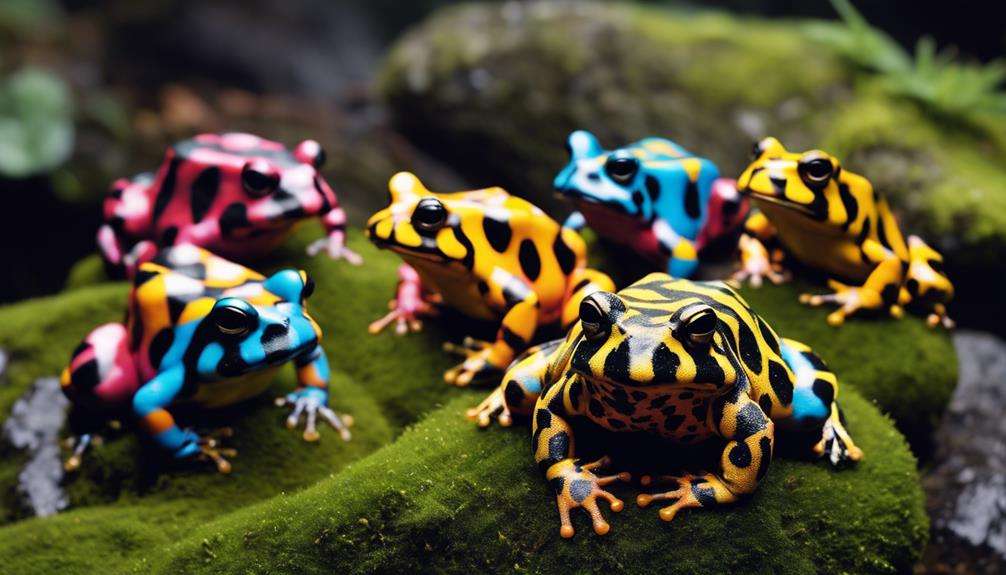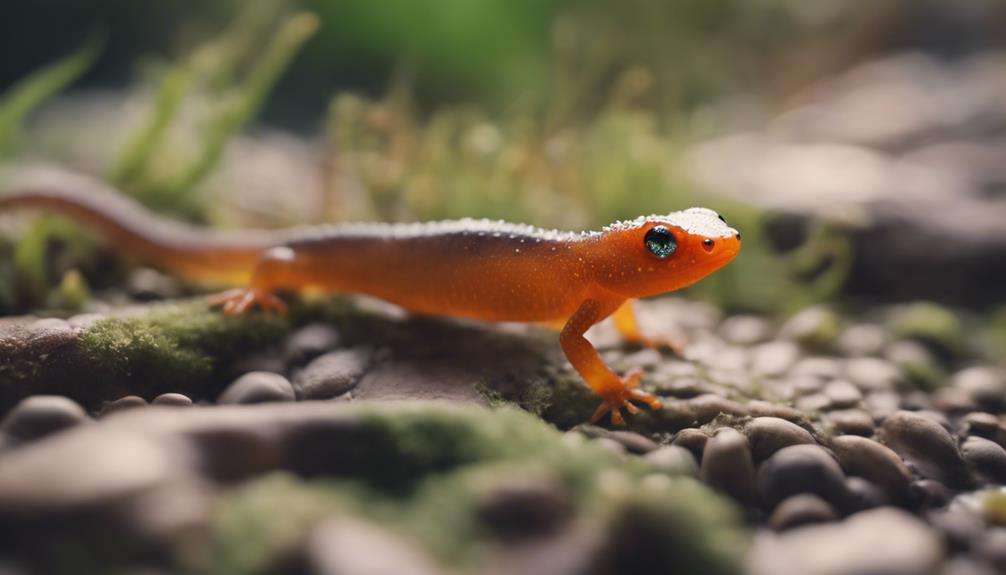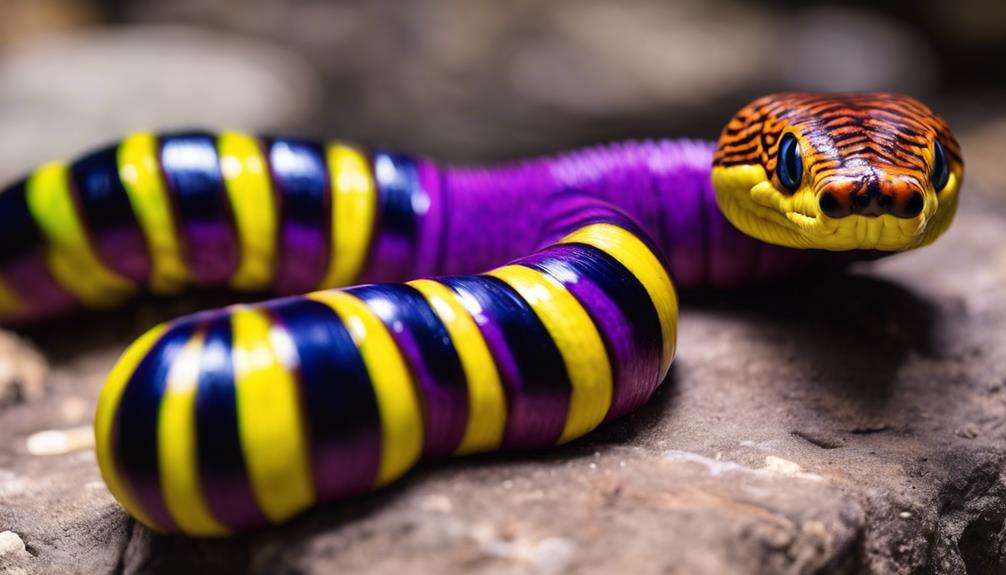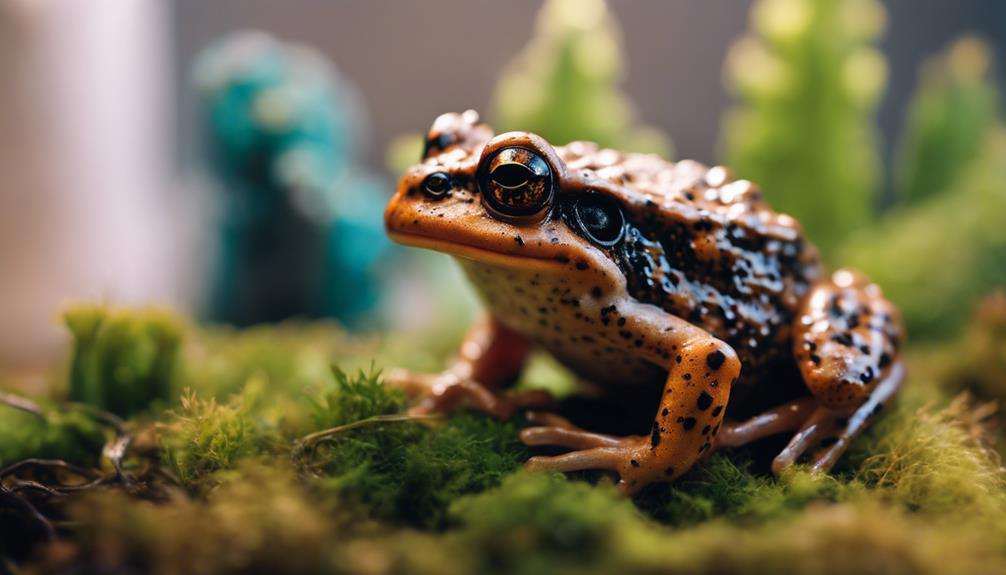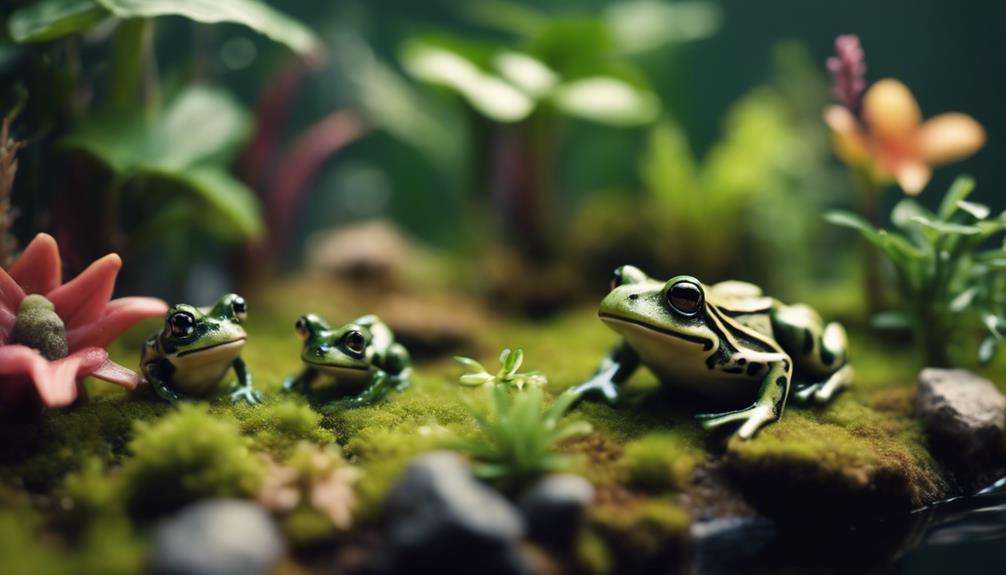Have you ever wondered what sets African Clawed Frogs apart as unique companions in the world of exotic pets?
These intriguing amphibians possess a set of distinctive features and behaviors that make them stand out among aquatic creatures. Their ability to adapt to tank living and communicate through fascinating methods is just the beginning of what makes them special.
Stay tuned to uncover more about why these frogs are cherished by enthusiasts and make for captivating additions to your home aquarium.
Key Takeaways
- Adaptability to tank environments simplifies care for novice owners.
- Unique feeding behavior using hands and claws enhances their allure.
- Longevity of up to 15 years and reproductive abilities make them fascinating pets.
- Valuable study subjects due to their life cycle and adaptability to various environments.
Adaptability to Tank Living
African Clawed Frogs excel in adapting to tank environments, showcasing remarkable resilience and ease of care for aquatic habitats. As fully aquatic creatures, these frogs are well-suited for tank living, eliminating the need for a land area in their habitat setup. Their adaptability to various water conditions makes them relatively easy to care for in tanks, as they can adjust to different parameters without much difficulty. This trait is particularly advantageous for novice frog owners or those looking for low-maintenance pets.
The African Clawed Frog's ability to thrive in captivity further enhances its appeal as a pet. Their resilience and capacity to tolerate fluctuations in water quality or temperature contribute to their overall hardiness. This adaptability not only simplifies their care requirements but also provides owners with a sense of security knowing that these frogs can withstand changes in their environment. Overall, the African Clawed Frog's adaptability to tank living and ability to adjust to diverse water conditions make them an excellent choice for aquatic pet enthusiasts.
Unique Feeding Behavior
With a unique feeding behavior distinguished by their lack of traditional tongues, African Clawed Frogs utilize their hands to eat, showcasing a remarkable adaptation to their aquatic lifestyle. These frogs rely on their sensitive fingers and keen sense of smell to locate food in the water.
Their hands play a crucial role in capturing and manipulating prey, as they lack a protruding tongue for catching food like many other amphibians. The claws on their hind feet assist them in tearing apart larger food items into manageable pieces for consumption.
African Clawed Frogs are known to be voracious eaters, displaying aggressive behavior when hunting. They'll eagerly attack anything that moves within their reach, making them efficient predators in their environment.
Their diet consists of a variety of prey, including arthropods, aquatic insect larvae, small fish, and more, reflecting their scavenging nature. This unique feeding behavior adds to the allure of keeping African Clawed Frogs as captivating pets.
Low Maintenance Care Requirements
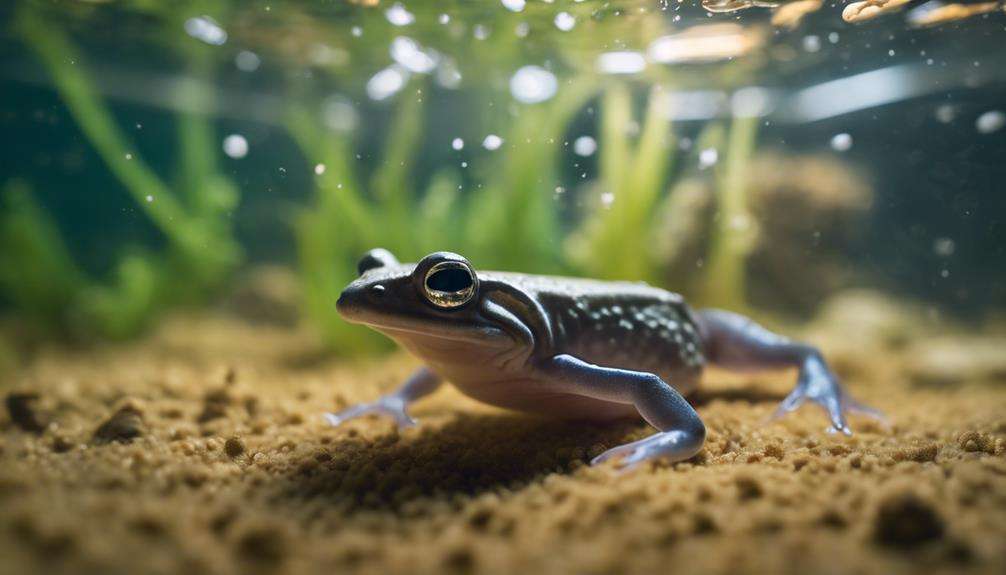
To maintain the health and well-being of African Clawed Frogs in your care, it's essential to understand their low maintenance care requirements. These fascinating amphibians have unique characteristics that make them stand out as pets:
- Hardy Nature: African Clawed Frogs are known for their resilience and adaptability to various water conditions, making them a low-maintenance choice for pet owners.
- Simple Dietary Needs: Feeding these frogs is a breeze as they primarily consume commercial pellets, worms, and feeder fish, requiring minimal effort to meet their nutritional needs.
- Long Lifespan: With a lifespan of up to 15 years, African Clawed Frogs require minimal veterinary care compared to other pets, reducing the time and resources needed for their well-being.
- Nocturnal Behavior: Their active nighttime habits allow owners to observe their natural behaviors during evening hours, adding an exciting element to caring for these unique creatures.
- Infrequent Water Changes: Proper tank setup and filtration systems enable owners to perform water changes less frequently, streamlining the maintenance process and saving time.
Fascinating Communication Methods
Understanding the fascinating communication methods of African Clawed Frogs sheds light on their unique abilities to convey information underwater through specialized movements and sounds. These frogs utilize a remarkable method of underwater vocalization, achieved without vocal cords. By employing movable rods with discs, African Clawed Frogs produce sounds that allow them to communicate effectively.
This unique trait sets them apart from other animals, as they can vocalize underwater to convey a wide range of messages. In 2019, the mechanism for their underwater vocalization was discovered, unveiling the intricate process behind their communication methods.
Through a combination of specialized movements and sounds, African Clawed Frogs engage in a complex form of interaction, making them intriguing pets to observe. Their ability to communicate underwater showcases the fascinating adaptations these frogs have developed for effective communication in their aquatic environments.
Long Lifespan for an Amphibian
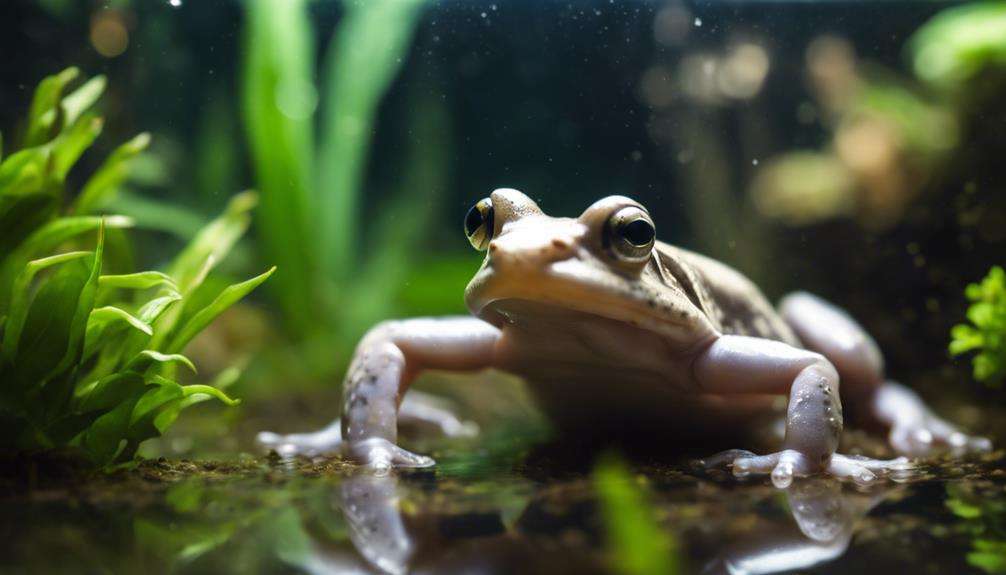
African Clawed Frogs boast an impressive lifespan, outliving many other amphibian species in captivity. Their health and care play crucial roles in determining how long they live, emphasizing the importance of proper husbandry practices.
Factors like water quality, diet, and habitat conditions all influence the longevity of these fascinating aquatic pets.
Lifespan Comparison With Others
Comparing the lifespan of African Clawed Frogs with that of other amphibian species reveals their impressive longevity in captivity. African Clawed Frogs have a lifespan of 15 to 20 years, exceeding the typical 5 to 10 years seen in many amphibians.
Here are some key points to consider:
- African Clawed Frogs can live 15-20 years, significantly longer than other amphibians.
- Some amphibians generally have a lifespan of only 5-10 years.
- Proper care and a suitable environment can help African Clawed Frogs reach the upper end of their lifespan.
- Their long lifespan allows for enduring companionship and rewarding relationships.
- Choosing African Clawed Frogs offers a unique opportunity for a pet with an extended lifespan in the amphibian world.
Health and Care
With a lifespan of up to 15-20 years, what key factors contribute to the long-term health and care requirements of African Clawed Frogs, making them unique among amphibian pets?
Female African Clawed Frogs require specific attention to water quality and habitat setup. Maintaining clean water, a balanced diet, and suitable UV lighting is crucial for their well-being.
Regular veterinary care, including check-ups and parasite prevention measures, plays a significant role in extending their lifespan. Owners must monitor their African Clawed Frogs for any abnormalities and provide a stress-free environment.
Factors Affecting Lifespan
To ensure your African Clawed Frog enjoys a long and healthy life, understanding the key factors that influence their lifespan is essential. Proper care, habitat conditions, and diet all play crucial roles in the longevity of African Clawed Frogs.
Their ability to adapt to captive environments and resilient nature also contribute to their extended lifespan. Monitoring water quality, providing a balanced diet, and regular veterinary care are essential for maximizing their lifespan.
Factors like stress reduction, disease prevention, and maintaining suitable tank conditions are vital in ensuring a long and healthy life for African Clawed Frogs. By focusing on these key aspects, you can help your frog thrive for up to 15 to 20 years in captivity.
Interesting Reproductive Characteristics
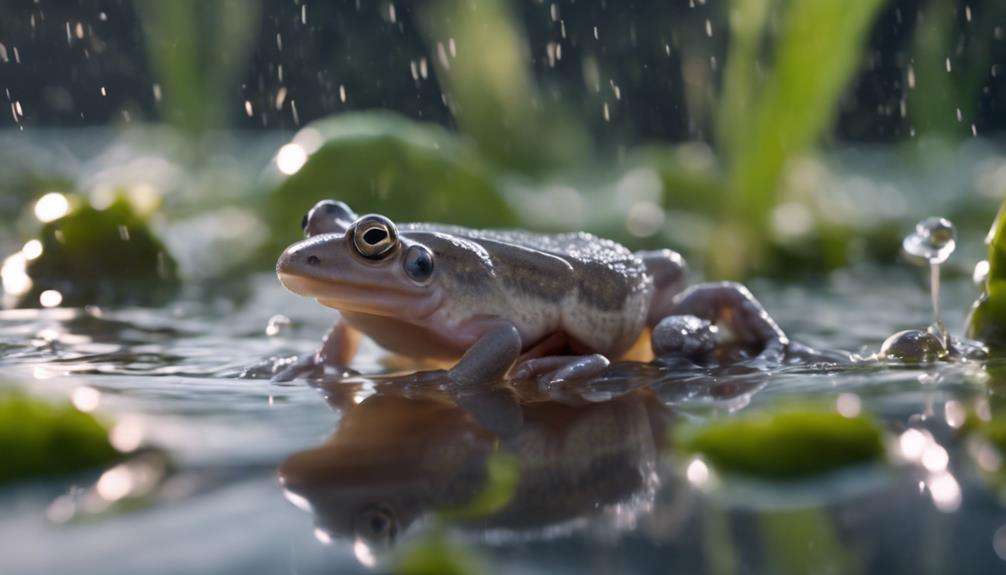
African Clawed Frogs exhibit fascinating reproductive characteristics, notably through their unique strategy of internal fertilization via amplexus. During amplexus, the male grasps the female around her body to release sperm as the female simultaneously releases her eggs, ensuring fertilization takes place internally.
Males showcase their communication abilities by producing underwater mating calls to attract females for this intricate reproductive process. Once fertilized, the eggs develop into tadpoles in the water. These tadpoles undergo metamorphosis, gradually transitioning into adult frogs, showcasing the remarkable life cycle of African Clawed Frogs.
Interestingly, these frogs can reproduce both in captivity and the wild, making them valuable subjects for study and observation. This ability to thrive in different environments adds to their appeal as pets and highlights their adaptability.
African Clawed Frogs' reproductive behavior offers enthusiasts a glimpse into the intricacies of nature and the fascinating world of amphibians.
Frequently Asked Questions
What Are the Unique Features of the African Clawed Frog?
African Clawed Frogs have unique features like their aquatic lifestyle, nocturnal behavior, and distinctive anatomy. With a potential lifespan of over 20 years, they showcase predatory feeding habits, limited social interactions, and specific environmental requirements.
Are African Clawed Frogs Good Pets?
African Clawed Frogs make good pets for those seeking low maintenance, peaceful companions. They thrive in an aquatic environment, with easy feeding habits and interesting behavior. Social creatures with unique personalities, they can be rewarding additions to your home.
Are African Clawed Frogs Smart?
You may find African Clawed Frogs to lack advanced intelligence, problem-solving skills, and cognitive abilities. However, they possess some learning abilities, memory capacity for feeding, and basic associative learning, showcasing potential for trainability in certain situations.
Do African Clawed Frogs Have Good Vision?
In their aquatic world, African Clawed Frogs excel in visual acuity. Their eyes, perched atop for stealth, aid in hunting strategies, feeding behavior, and response to stimuli. These adaptations are vital for their survival and thriving in their habitat.
Conclusion
You've learned about the unique characteristics of African Clawed Frogs that make them special pets.
Did you know that these fascinating amphibians can live up to 15 years in captivity?
Imagine the joy of watching your aquatic friend swim, feed, and communicate in their own unique way for over a decade.
With proper care and attention to their needs, African Clawed Frogs can be rewarding companions for years to come.
